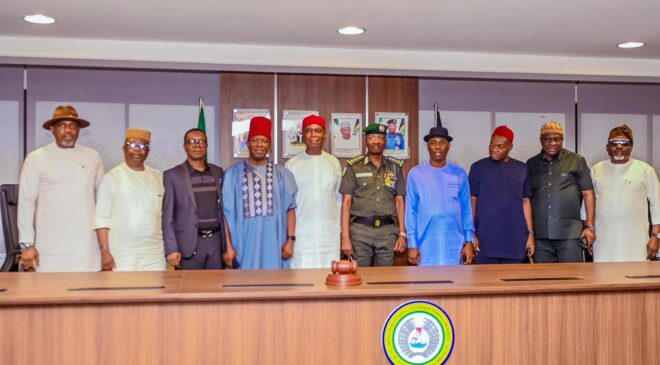
By Austin Oyibode
ABUJA/Nigeria: Chairman of the Senate Ad-Hoc Committee on Crude Oil Theft, Senator Ned Nwoko, has intensified Nigeria’s fight against oil theft through a series of high-level engagements with key petroleum regulators and foreign partners. At the forefront of this renewed offensive is the drive to strengthen institutional collaboration, attract international investment, and restore confidence in Nigeria’s embattled energy sector.
On August 1, 2025, Senator Nwoko met with top officials of the Nigeria Upstream Petroleum Regulatory Commission (NUPRC) and the Nigerian Midstream and Downstream Petroleum Regulatory Authority (NMDPRA). He was joined by Spanish energy expert and counterpart, Mr. Bernardino Ferrer. Their discussions centred on boosting foreign direct investment and tightening regulatory gaps across the oil value chain. “These engagements are part of our commitment to building a more secure, transparent, and investment-friendly petroleum industry,” Nwoko said.
Despite recent reports by NUPRC indicating a drop in crude oil theft to about 5,000 barrels per day in early 2025, a 58.3% reduction compared to previous figures, Nwoko stressed that unreported and indirect losses still represent a significant threat to national revenue and energy security. Crude oil theft, estimated at over 200,000 barrels daily at its peak, has drained Nigeria’s economy and diminished its global credibility. He noted that stopping this menace requires coordination between legislators, regulators, military institutions, and international actors.
Recent military crackdowns underscore this urgency. Since June 2023, the Nigerian Navy has arrested 76 vessels linked to oil theft, recovering over 171,000 barrels of crude and millions of litres of illegally refined products. In May 2025 alone, the armed forces dismantled 19 illegal refining sites and arrested 20 suspects. The introduction of 37 new evacuation routes by the federal government has also been designed to outmaneuver criminal operations and enhance pipeline security.
Earlier in the week, Senator Nwoko and members of the Senate Committee met with the Inspector General of Police, Kayode Egbetokun, to initiate a unified enforcement framework. Beyond enforcement, Nwoko is advocating for long-term reforms—tougher penalties for oil thieves, improved traceability systems for crude movement, enhanced community participation in asset protection, and the engagement of forensic financial experts to track stolen oil through international markets.
The senator’s meeting with the NMDPRA emphasized the need for regulatory overhaul and technological integration to monitor petroleum flows more effectively. He maintained that only a well-secured, well-regulated environment would attract serious investors who are otherwise deterred by entrenched corruption and insecurity in the oil sector. The participation of Mr. Ferrer signalled growing interest in cross-border partnerships, although specific agreements remain under wraps.
While the Nigerian Economic Summit Group recently warned that aging infrastructure, pipeline vandalism, and weak regulatory enforcement continue to hinder sector growth, Senator Nwoko believes the nation is approaching a pivotal moment. “Progress is real, but fragile,” he stated. “We must act decisively and consistently to protect our resources and unlock the full potential of our energy sector. What we do in the coming months will shape Nigeria’s economic future.”
Let me know if you’d like this edited further for print, or with quotes formatted for layout purposes.
